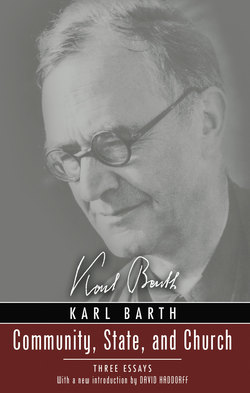Отрывок из книги
COMMUNITY, STATE, AND CHURCH
Three Essays
.....
Hence, once the positive relations of church and state are explained, the document rejects a totalitarian conception of the state. When the state becomes totalitarian it takes upon itself an idolatrous spiritual function, and further challenges the church to act politically against the state. In response, the state must resist the temptation to become the sole power in society, and the church must resist the temptation to control society through the methods and strategies of the state, thus becoming an “organ of the state.” It is important to remember that paragraph five does not stand on its own, but remains in concert with the other paragraphs, particularly paragraph one, which places both church and state under the “one Word of God.” This Christological basis for the state becomes more saliently expressed in his later political writings, but is also present in this document as well as earlier in his Ethics lectures.
How was Barmen received by the opponents of the Confessing Church? The German Christians never attempted to address the theological grounding of Barmen, but only its political ramifications. As implied earlier, the German Christian movement was not strongly theological, and except for a few theologians like Emmanuel Hirsch, did not attempt to speak theologically about politics. A more important theological reaction can be noticed at an academic conference that was held at Anbasch, a few weeks after Barmen, which included many of the more well-known theologians who did not belong to the Confessing Church. This so-called Anbasch Counsel denounced the Declaration as faulty theology because it failed to distinguish between the ‘two kingdoms’ and two principle loci of law and gospel, which invariably denied the existence of natural theology. Led by Lutherans like Paul Althaus and Werner Elert, the council affirmed that “God’s word speaks to us as law and gospel.” “The law,” they added, “binds us to the natural orders to which we are subject, such as family, folk, and race (i.e., blood relationship).”54 Indeed, regarding natural theology, Elert later wrote: “The proposition that apart from Christ no truth is to be acknowledged as God’s revelation is a rejection of the divine authority of the divine law beside that of the gospel.”55 Since Barmen did not address the longstanding debate between Lutherans and Reformed about the relationship of the law and the gospel, what worried Elert and Althaus is that Barth was implicitly placing the gospel before the law, by placing them both under the Word of God. This pattern of gospel-law stands in contrast to the traditional Evangelical pattern of law-gospel, which on one hand affirmed the theological legitimacy of the state and orders of society, and on the other kept the gospel ‘pure’ by limiting its use only to the church. From this viewpoint, Barmen reflected a kind of ‘anarchist theology’ that undermined the authority of social institutions established in God’s ordered creation. Yet, as we know, Barth was no anarchist but a democratic constitutionalist; in fact, he realized that the traditional law-gospel pattern was incapable of challenging the ideology of the German Christians, who identified the divine law with the human laws in society. Barth rightly surmised that this law-gospel pattern, once blended with a liberal naiveté, was the basis for the natural theology of the German Christians. A year later, in his essay “Gospel and Law,” he eventually worked out his position more clearly, but before that he was forced to write his famous Nein to natural theology.
.....
